- Home
- Joseph Bruchac
Sacajawea
Sacajawea Read online
Table of Contents
Title Page
Table of Contents
Sacajawea's Journey Begins
The Voyage of Lewis and Clark
Copyright
Dedication
Prologue
1. SACAJAWEA
2. WILLIAM CLARK
3. SACAJAWEA
4. WILLIAM CLARK
5. SACAJAWEA
6. WILLIAM CLARK
7. SACAJAWEA
8. WILLIAM CLARK
9. SACAJAWEA
10. WILLIAM CLARK
11. SACAJAWEA
12. WILLIAM CLARK
13. SACAJAWEA
14. WILLIAM CLARK
15. SACAJAWEA
16. WILLIAM CLARK
17. SACAJAWEA
18. WILLIAM CLARK
19. SACAJAWEA
20. WILLIAM CLARK
21. SACAJAWEA
22. WILLIAM CLARK
23. SACAJAWEA
24. WILLIAM CLARK
25. SACAJAWEA
26. WILLIAM CLARK
27. SACAJAWEA
28. WILLIAM CLARK
29. SACAJAWEA
30. WILLIAM CLARK
31. SACAJAWEA
32. WILLIAM CLARK
33. SACAJAWEA
34. WILLIAM CLARK
35. SACAJAWEA
Author's Note
Selected Bibliography
Sacajawea's Journey Begins
IF I COULD REACH THE OTHER BANK, which was steep and sandy, I might be able to scurry up it as my friend had just done. The horses' hooves would sink in the sandbank and slow them down.
But the sound of the closest rider's horse was right behind me, it's breath chuffing. I could hear the thump of the rider's heels on the sides of his horse.
"Hey-yah!" the rider shouted, urging his horse on. Then he shouted something else in an enemy language that I could not speak. Whatever it was, his voice was too close.
I turned then. I knew I could not escape and I did not want to be caught from behind. What else could I do? I was a girl with no weapons. I stood there in the middle of the stream with my head raised.
The rider stopped just short of riding me down. I knew what he was probably thinking—Good, now I will not have to hurt this one to catch her. She will be valuable as a captive. She will be one who can help my mothers and sisters with their work. Maybe I will even be able to sell herfor a good price.
I recognized by his clothing that he was a Minnetaree, and by the way his face and his horse were painted. Hidatsa, they call themselves. Then he smiled.
I spat into the water between us. I looked hard at him, wishing I could kill him with my eyes. But my eyes were neither a lance nor a war bow. So I became a captive. So my long journey began.
The Voyage of Lewis and Clark
Copyright © 2000 by Joseph Bruchac
All rights reserved. No part of this publication may be reproduced or transmitted in any form or by any means, electronic or mechanical, including photocopy, recording, or any information storage and retrieval system, without permission in writing from the publisher.
Requests for permission to make copies of any part of the work should be submitted online at www.harcourt.com/contact or mailed to the following address: Permissions Department, Houghton Mifflin Harcourt Publishing Company, 6277 Sea Harbor Drive, Orlando, Florida 32887-6777.
www.HarcourtBooks.com
First Harcourt paperback edition 2008
The Library of Congress has cataloged the hardcover edition as follows:
Bruchac, Joseph, 1942–
Sacajawea; the story of Bird Woman and the Lewis and Clark Expedition/Joseph Bruchac.
p. cm.
Summary: Sacajawea, a Shoshoni Indian interpreter, peacemaker, and guide, and William Clark alternate in describing their experiences on the Lewis and Clark Expedition to the Northwest. 1. Sacajawea, 1786–1884—Juvenile fiction. 2. Clark, William, 1770–1838—Juvenile fiction. 3. Lewis and Clark Expedition (1804–1806)—Juvenile fiction. [1. Sacajawea, 1786–1884—Fiction. 2. Clark, William, 1770–1838—Fiction. 3. Shoshoni Indians—Fiction. 4. Indians of North America—Fiction. 5. Lewis and Clark Expedition (1804–1806)—Fiction. I. Title.
PZ7.B82816Sac 2000
[Fic]—dc21 99-47653
ISBN 978-0-15-202234-1
ISBN 978-0-15-206455-6 pb
Text set in Adobe Caslon
Designed by Ivan Holmes
C E G H F D B
Printed in the United States of America
In memory of my mother, Marion Bowman Bruchac,
whose feet now walk the Road of Stars
Prologue
JEAN BAPTISTE CHARBONNEAU
GREEN RIVER TRADERS' RENDEZVOUS, 1833
My friends, as we gather around this fire, let me tell you a story. It is the story of how the worlds of the white men and the Indians came together. There is no one better to tell the story than I, Jean Baptiste, for I am of both worlds. I was there on that great journey. Now I am a man who has seen twenty-eight winters, but then I was a child.
It is a story of hard travels and many wonders, a story of bravery and kind deeds, of treachery and great danger, of strange men and even stranger places, of high mountains and rivers. It is a story of suffering and triumph.
I have been far since then. I have been to the schools of the white men, I have traveled to Europe, and I have made friends with kings and princes, guiding them to hunt the buffalo on the plains. I have ridden, too, by the side of war chiefs and shared the lodges of many Indian nations. Yet no kings or princes, no warriors or chiefs were ever better men than those who took me on that journey with them. Of all those who were part of that great adventure, there is one who was the bravest and best of them all. A greathearted woman. Though she was little more than a child when it all began, she was the finest person I ever knew. That woman was my mother, Sacajawea.
But I cannot tell the whole of the story, for I was only a baby during those years. It is the custom of my mother's people, the Shoshones, that one can tell only what they have seen. When the Shoshones come to something they do not know, one who was there must tell the tale.
Those two voices who told that tale to me, my mother's and my uncle's, will now tell it to you. It is the shared telling of this story that is the beginning of my life. Now, brought back to life and breath are those voices, as I remember them in my heart. Here is my mother, Sacajawea. Here is my adopted uncle, Captain William Clark.
Listen. Here is our story.
1. SACAJAWEA
The Camp by the River
Long ago, there was a great flood. It covered all of the earth, except for the top of the tallest mountain. All of the people were drowned beneath the waters. The Great Mystery sat on top of that mountain and decided to make things all over again. He called to the birds, who had survived by flying up into the air, to help him.
"Dive down beneath the water and bring up some dirt."
So the birds began to try to do as the Great Mystery asked. The one who succeeded in bringing up some dirt was Chickadee. From that dirt, a new earth was made, and placed on the back of the big turtle. Then, from that dirt, new people were made.
ST. LOUIS, LOUISIANA TERRITORY, 1811
FIRSTBORN SON, how has your day been? I remember what it was like when I was a child of seven winters such as you. Everything around me was exciting, though our lives were much simpler in our mountains than here in this great city of St. Louis. I still find this place confusing. I am glad that we have your good uncle Captain Clark to watch over us while you and your father, Charbonneau, and I are here as guests in his great house.
But now that your busy day is over, perhaps you would like to hear a story? What story shall I tell? Ah, that story, the one I tol
d you I would share with you only once we were here in the house of your red-haired uncle, so that he could help me tell it. It is a story too big for just one person to tell, this story of our long journey.
All right, then, I will begin in the place where I began, there near the three rivers, at the foot of the great mountains that divide the sky.
***
We were poor people. That is how it was then, my son. We were not as poor as our cousins who lived farther downriver and toward the direction of the sunset. They were so poor that they had no horses at all. All of the other tribes called them Walkers. At least we had horses.
We were poor because we had no guns, as did the Atsina and Siksika. As did the other nations who lived close to the French and English and American traders. Those other nations, especially the Pahkees, the Blackfeet, they drove us off the plains and up into the mountains with their guns.
But poor as we were, we still had horses. We cared for our horses well. Our horses were like members of our families. With horses our young men could go back down the mountains and slip out onto the plains to hunt the buffalo. They always had to be on the lookout for enemies, but our horses were swift and our scouts were alert. On the plains you can see enemies coming from far away and escape. It is harder to see far away when you are in the mountains. So we discovered that day.
***
The day started off as a good day. Our village was camped at the place where the three rivers join. The sun shone on the water as it rippled and flowed.
I remember finding a little stick that was the shape of a canoe. I dropped it into the main river and watched as it floated away.
"River," I said, "where are you going in such a hurry? What would it be like to float along with you?"
I did not know how soon I would find out.
It was the Moon When the Berries Are Ripe. That is why my best friend and I were away from the camp, a short distance downstream from the others. There were berry bushes there. We were picking berries happily, and singing the picking song our children sometimes sing. You know that song.
This berry is large, I'll put it in my basket.
This berry is small, TUput it in my mouth.
That day, as I remember, we had probably put more berries into our mouths than into our baskets. Our faces and fingers were as red as blood from the juice of fat ripe berries. Even though in our song we said the berries were small, I remember that they were very fat. All the berries were fat when I was young.
I had eleven winters. I had a husband already. I did not live with him. I was still in the lodge of my parents. But I had been promised to a man by my father. That man, my husband-to-be, had already made a gift of horses to my family. In less than a handful of winters, I would have gone to him. But then I would never have met your father. I would never have taken my first long journey. I would never have become the Woman Who Was Lost. You, my tall boy, would never have been here in the house of your good uncle.
How did we know there was trouble? My best friend, Wren, was the first to hear the cry.
"Enemies! Many enemies!"
Perhaps it was my older brother, Stays Here, who shouted the alarm. He was always the most alert of the young men, and it was said even then that he would surely become a chief. But by the time I saw him and my people again, even he could not remember who first saw the attack coming.
The first sound of guns came right after that shout. I stood there, unable to move. Wren tugged my hand. Then she tugged it harder.
"Boat Pusher," she shouted, "we must flee."
Then she was off, running away from the sounds of shouting and gunfire and the pounding of horses' hooves. I looked back toward our village. People were scattering in all directions like a flock of ducks before a diving hawk. They were too far away for me to join them.
I followed Wren as best I could. But her legs were longer than mine and I could not keep up with her. As fast as we ran, though, it was no use. The enemies had attacked from more than one direction. There, right in front of us, were more enemies on horseback We were running right toward them.
That was when Wren received her new name. She turned and ran across the stream. With her long legs she leaped and bounded and was across almost as quickly as a slopping stone or a jumping fish. And as I would learn later, that became her name for the rest of her life, Jumping Fish.
I tried to follow. I remember the water splashing around my feet as I struggled toward the other side. I remember slipping on the stones and the sound of my own breath as I half ran and half swam through that cold water. If I could reach the other bank, which was steep and sandy, I might be able to scurry up it as my friend had just done. The horses' hooves would sink in the sandbank and slow them down.
But the sound of the closest rider's horse was right behind me, its breath chuffing. I could hear the thump of the rider's heels on the sides of his horse.
"Hey-yah!" the rider shouted, urging his horse on. Then he shouted something else in an enemy language that I could not speak Whatever it was, his voice was too close.
I turned then. I knew I could not escape and I did not want to be caught from behind. What else could I do? I was a girl with no weapons. I stood there in the middle of the stream with my head raised.
The rider stopped just short of riding me down. I knew what he was probably thinking—Good, now I will not have to hurt this one to catch her. She will be valuable as a captive. She will be one who can help my mothers and sisters with their work. Maybe I will even be able to sell herfor a good price.
I recognized by his clothing that he was a Minnetaree, and by the way his face and his horse were painted. Hidatsa, they call themselves. Then he smiled.
I spat into the water between us. I looked hard at him, wishing I could kill him with my eyes. But my eyes were neither a lance nor a war bow. So I became a captive. So my long journey began.
2. WILLIAM CLARK
The Corps of Discovery
We are to ascend the Missouri River with a boat as far as it is navigable and then to go by land, to the western ocean, if nothing prevents, & c.
This party consists of 25 picked Men of the armey & country and I am so happy as to be one of them pick'd Men....
We are to Start in ten days up the Missouri River.... We expect to be gone 18 months or two years. We are to Receive a great Reward for this expedition, when we Return.
—LETTER OF SERGEANT JOHN ORDWAY
TO HIS PARENTS, DATED APRIL 8, 1804
WHERE WAS I WHEN YOUR MOTHER was taken captive?
Pomp, my lad, you ask questions like a Virginia lawyer. Are you sure you are only seven years old? Yes, I know you are. As sure as I know you can already speak English and French, Hidatsa and Shoshone. But you still want an answer, eh? Far away from the Three Forks, that is the easy answer.
Yes, I am certain Captain Lewis and I would have come to her aid had we been there. When those Hidatsa raided the Shoshone village, that would have been 1799. July, if the berries were ripe.
But the first time we met your mother was five years later. November of 1804, it was. At Fort Mandan, on the north bank of the Missouri River, just across from the lower Mandan village led by Big White and Little Raven.
Why were we there? I will tell you the tale, a bit of it at least, today. Maybe more tomorrow. It is the tale of the best group of men and the finest captain I have ever known, God rest my dear friend's soul. It is the story of the Corps of Discovery, and your mother's story, too. Her life was as much changed by our journey as our lives were changed, for the better, by knowing her.
For me it began when a letter written on June 19, 1803, came.
Who was it from? Right, indeed, lad. It was from Meriwether Lewis. Captain Lewis, by then. When I first met him, in 1795, he was an ensign on the Ohio frontier and under my command. A fine marksman, as were all my men. His last commanding officer had not much liked Ensign Lewis. Even back then Meri was, well, excitable. Never one to be patient with a fool, even if that fool outran
ked him.
But there was no trouble between us. Nor would there ever be. I admired his courage and his pride, the spirit that I thought then could never be broken. He served only six months in my Chosen Rifle Company, but in that time the two of us became as close friends as any two can ever be. When we parted company he clasped my hand with just as much warmth as I did his.
"Billy," he said, "one day we two shall do great things together."
Now, if another man said that, you might have laughed. But not when it was said by Meriwether Lewis. So I just nodded back to him, not knowing how true those words of his would prove to be. Then, almost eight years later, that letter arrived. It asked me to take part with him in an adventure. These words I know by heart:
"My plan," Captain Lewis wrote, "is to descend the Ohio River in a keeled boat, thence up the mouth of the Mississippi to the mouth of the Missouri, and up that river ... to its source, and if practicable pass over to the waters of the Columbia or Oregon River and by descending it reach the Western Ocean."
That plan, of course, came from Thomas Jefferson. Everyone knew that our new president longed to have the western part of the continent explored. Captain Lewis had been taken on as the personal secretary to Jefferson several years before, so that Meri could be trained to lead just such an undertaking. Jefferson also had an abiding curiosity about all things scientific and human. So we were to make maps, observe latitude and longitude, and collect specimens and information wherever we went. Making contact with the various Indian nations, both to know them and to civilize them, was to be one of our primary objectives, as was the arranging of peace treaties among Indian nations.
Think of that, the boldness of it. We would cross the continent and be the first Americans to do it. That in itself was enough to make me as eager as a starved trout is to bite on a baited hook.

 Peacemaker
Peacemaker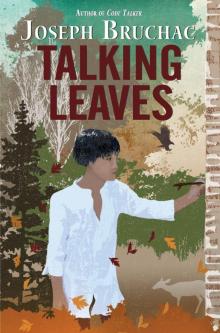 Talking Leaves
Talking Leaves Found
Found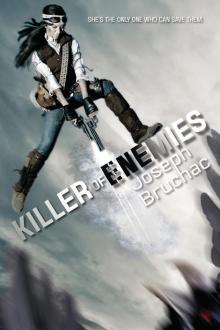 Killer of Enemies
Killer of Enemies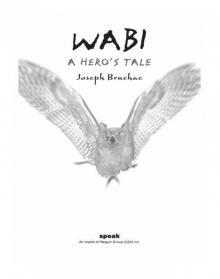 Wabi
Wabi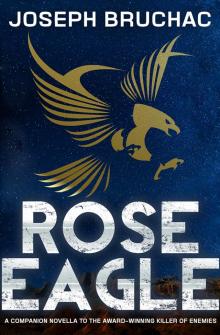 Rose Eagle
Rose Eagle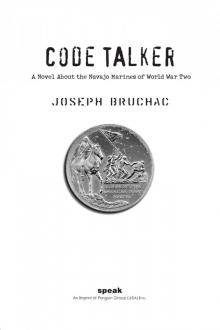 Code Talker
Code Talker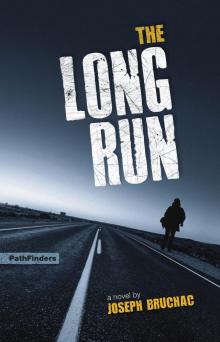 The Long Run
The Long Run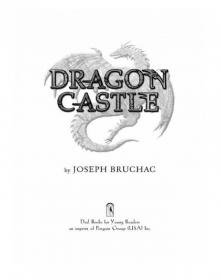 Dragon Castle
Dragon Castle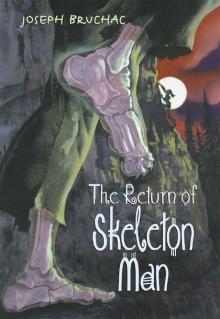 The Return of Skeleton Man
The Return of Skeleton Man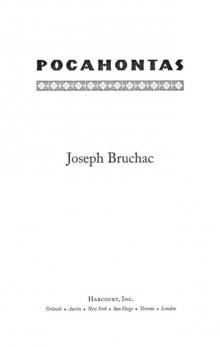 Pocahontas
Pocahontas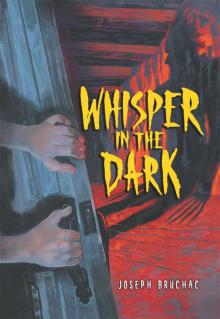 Whisper in the Dark
Whisper in the Dark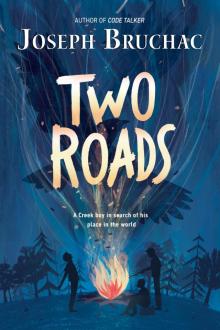 Two Roads
Two Roads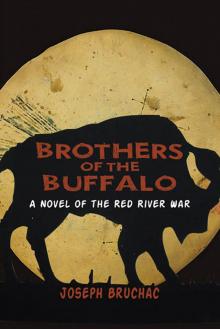 Brothers of the Buffalo
Brothers of the Buffalo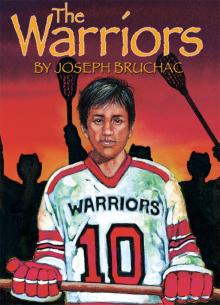 The Warriors
The Warriors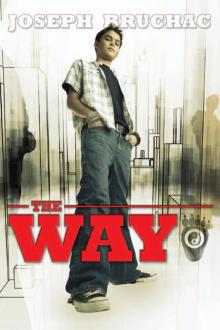 The Way
The Way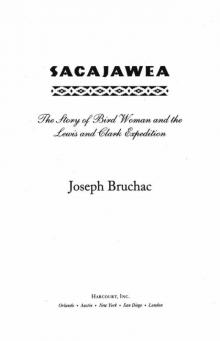 Sacajawea
Sacajawea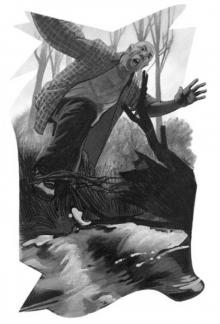 Night Wings
Night Wings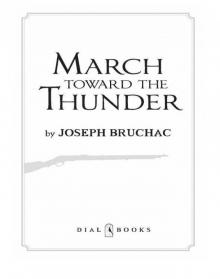 March Toward the Thunder
March Toward the Thunder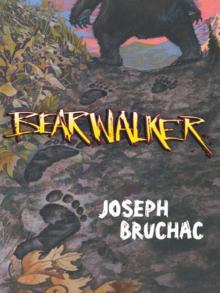 Bearwalker
Bearwalker Skeleton Man
Skeleton Man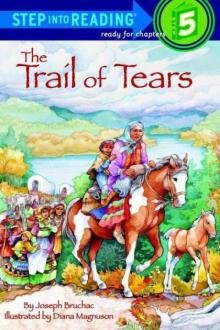 The Trail of Tears
The Trail of Tears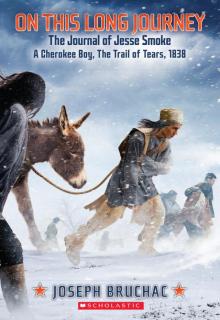 On This Long Journey
On This Long Journey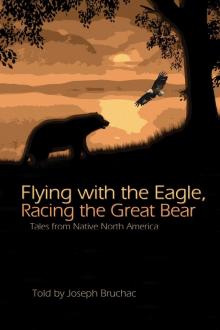 Flying with the Eagle, Racing the Great Bear
Flying with the Eagle, Racing the Great Bear